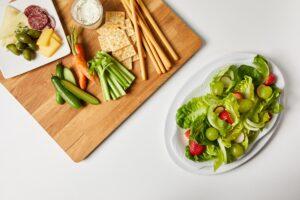How to have a waste-free Christmas
The holidays are approaching, and with them the biggest baking and cooking season of the year, when we sometimes tend to overdo it. We strive to provide every guest with plenty of delicious snacks, but after the holidays we can find ourselves with a lot of leftovers in our refrigerators, which then end up in the trash after a few days. LG Hungary experts have now collected the most useful tips if we want to avoid waste this year.
 According to the latest data from the Hungarian Food and Drug Administration, we produce an average of 62 kg of food waste per person in our households every year, but 25.8 kg of this, or about 40,000 forints per person, could be avoided if we shop consciously and store the purchased products properly. Moreover, the most common waste we throw away is ready-made meals, 11.79 kg per person per year. Holidays play a significant role in these numbers, when we tend to buy and cook larger portions than necessary, and we also try to conjure up new dishes for each main meal, which also results in more leftovers. But let’s see what we can do if we want to do all this more consciously this year!
According to the latest data from the Hungarian Food and Drug Administration, we produce an average of 62 kg of food waste per person in our households every year, but 25.8 kg of this, or about 40,000 forints per person, could be avoided if we shop consciously and store the purchased products properly. Moreover, the most common waste we throw away is ready-made meals, 11.79 kg per person per year. Holidays play a significant role in these numbers, when we tend to buy and cook larger portions than necessary, and we also try to conjure up new dishes for each main meal, which also results in more leftovers. But let’s see what we can do if we want to do all this more consciously this year!
Plan ahead
As a first step, we should carefully think through the programs for the holiday season. Let’s agree with guests and family members about when and how many people will arrive, and also calculate if we would leave home. Based on this, once we know exactly when and for how many people we will be cooking, we can start carefully compiling the menu. Don’t rush to the store to get the necessary ingredients: first, let’s look at what is on the list that you already have in your pantry and household. When shopping, if you add items that require refrigeration or are frozen to your cart, you should head straight home from the store or bring a cooler bag. If the products warm up before they are put back in the refrigerator, it can cause them to spoil prematurely.
Sort the food immediately
Once you have purchased everything, think about what really needs to go in the refrigerator. This is important not only because certain foods can be damaged by constant cold, but also because if you don’t fill the refrigerator to the brim, the air inside can circulate comfortably, which helps it function efficiently. Vegetables – whether they are soft like tomatoes or harder like potatoes or onions – can be safely stored in the pantry, especially in winter. More delicate vegetables, such as lettuce and fresh herbs, require refrigeration and the highest possible humidity for maximum freshness and flavor. If your refrigerator has a humidity-controlled compartment, it is worth using this feature: the so-called Fresh BalancerTM technology, for example, ensures optimal humidity in the drawer depending on whether the fruit or vegetable mode is set.
Related news
New business areas drive growth at CECONOMY – record customer satisfaction and online share
🎧 Hallgasd a cikket: Lejátszás Szünet Folytatás Leállítás Nyelv: Auto…
Read more >Related news
Protein, gut health and mental wellbeing – these trends will shape global food innovation in 2026
🎧 Hallgasd a cikket: Lejátszás Szünet Folytatás Leállítás Nyelv: Auto…
Read more >Festive table, new habits
🎧 Hallgasd a cikket: Lejátszás Szünet Folytatás Leállítás Nyelv: Auto…
Read more >









